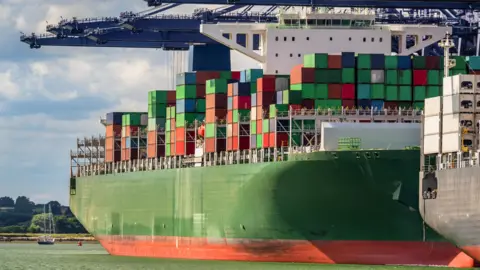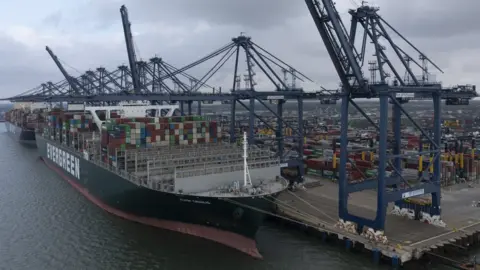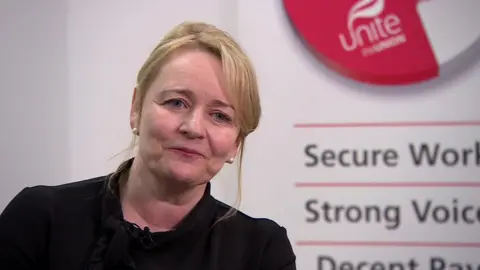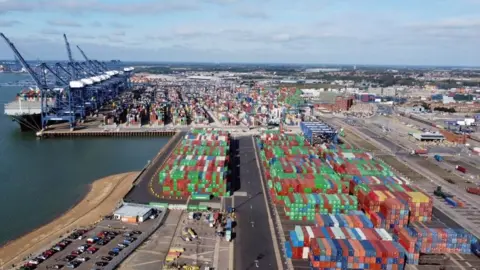Port of Felixstowe strike will cost us a stack of money - haulier
 Getty Images
Getty ImagesWorkers in Felixstowe, Suffolk, are striking in a row about their pay, with eight days of industrial action at the UK's largest container port. What could it mean for those reliant on goods coming in to the port?

Why is the strike happening?
About 2,550 people work at the Port of Felixstowe, which is the UK's biggest container port, handling 48% of container trade.
About 1,900 Unite members walked out from 07:00 BST for eight days, after rejecting a 7% pay offer from Felixstowe Dock and Railway Company, which operates the port.
The offer also includes a one-off £500 payment.
Unite says the pay offer is "significantly below" the rate of inflation but the port insists it is a "very respectable offer".

What will it mean for businesses?
 Turners of Soham
Turners of Soham"About 30% of our business is at Felixstowe, so it's going to have a huge impact," says Paul Day, managing director of haulage company Turners (Soham).
The Cambridgeshire company moves about 500 containers out of the port every day.
"We might be able to keep operating for two or three days but I can't see we'll be able to after that," he says.
"It will cost us a stack of money, but all I can do is optimise what we can do and try to minimise the damage - but the damage is coming."
 Mick's Cycles
Mick's CyclesDerek Hailstone, co-owner of Mick's Cycles, in Bury St Edmunds, Suffolk, says the majority of his stock comes in through Felixstowe.
The company has been trading in the Suffolk town since 1970.
"The strikes have the potential to affect us, as most of our stock comes into the UK through Felixstowe," he says.
"A lot will depend on how much stock is already being held in Felixstowe and whether that can come out of the port."
He says the key factor for his business would be whether the shipments headed for Felixstowe can be diverted to other ports around the UK.
"If they divert to other ports, then we'll be OK," he says.
 Openultra
Openultra Haydyn Rowlandson, traffic operator for Openultra haulage company, based in Felixstowe, says collecting deliveries from other ports would mean additional costs for customers.
"Vessels are being diverted to ports such as Southampton but, clearly, if we have to go there, it significantly changes the rate of the job," he says.
"One collection would cost hundreds of pounds more as there is extra wear and tear, the additional fuel and driver hours."
But the looming strike is already having an effect on business.
"We have had to stand vehicles down, we have had to stand drivers down and the workload has been minimal in comparison with the last few weeks," he says.
"Customers are ringing us up on a daily basis and asking if we know what is happening.
"They're taking a hit, we are taking a hit - and the country is taking a hit, too."

What will it mean for shoppers?
 Getty Images
Getty ImagesJames Hookham, director of Global Shippers Forum, says: "We are just entering peak season for consumer goods movements in UK international trade and transport.
"From now on, ships will be arriving from the Far East in increasing numbers, with containers of goods destined for retail outlets and online distribution centres to be ready for the three peaks in retail sales - Halloween (half-term holidays), Black Friday (last weekend in November) and Christmas."
He says a prolonged strike "has the potential to disrupt the UK's consumer supply chains at a critical period".
"These containers are moving aboard some of the biggest ships in the world - think Ever Given - and are moving in such numbers and frequency that other routes or transport modes (overland by rail from China to Europe, or by air cargo) simply don't have the capacity to handle these numbers, at such short notice," he says.
"Consumer prices are already rising due to the dramatic increases in shipping rates experienced since mid-2020.
"Further disruption in the UK will add to these cost pressures, although temporary unavailability of some goods may be the first noticeable effect to consumers."

What does the union say?

Unite says eight days of strike action at the port will run until 29 August.
Its general secretary Sharon Graham says: "Felixstowe docks is enormously profitable. The latest figures show that in 2020 it made £61m in profits. Its parent company, CK Hutchison Holding Ltd, is so wealthy that, in the same year, it handed out £99m to its shareholders.
"So they can give Felixstowe workers a decent pay raise. So they should do so. It's clear both companies have prioritised delivering multi-million pound profits and dividends rather than paying their workers a decent wage."
She says the union is "entirely focused on enhancing its members' jobs, pay and conditions and it will be giving the workers at Felixstowe its complete support until this dispute is resolved and a decent pay increase is secured".

What does the port say?
 Reuters
Reuters"I think we've made a very respectable offer," says Paul Davey, spokesman for the port.
"The 7% plus £500 means this year it's an increase of between 8.1% and 9.6% depending upon the category of worker at the port, and I think at a time when the average pay increase in the country is 5% - we've got a shrinking economy, we're going into recession - as a country I think that's a very fair offer indeed.
"Unite head office have refused the pay deal on behalf of their employees locally. We know a lot of the employees locally would be quite happy to accept that."
The Bank of England has warned the UK will fall into recession in the final three months of this year when inflation is set to hit more than 13%.
He says some shipping companies have brought forward shipment dates while others have delayed them to avoid the strike period.
He adds: "It will have an impact - it won't be catastrophic.
"It's not great news for the logistics and the supply chain but they will work around it. There won't be shortages of goods or anything like that."

Find BBC News: East of England on Facebook, Instagram and Twitter. If you have a story suggestion email [email protected]
